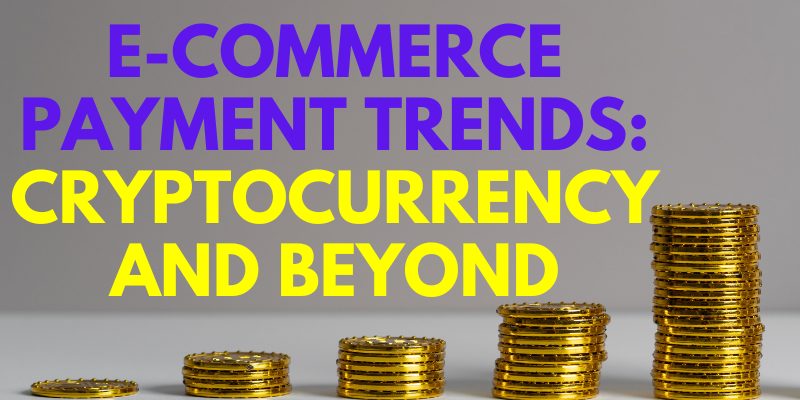
Both the world of e-commerce and the payment mechanisms utilised for online transactions are constantly changing. Consumers are looking for quicker, more practical, and secure ways to make transactions as technology develops. We will examine the most recent payment trends in e-commerce in this blog article, with an emphasis on the usage of cryptocurrencies and digital wallets. For businesses aiming to offer their consumers easy and safe payment experiences, staying on top of these developments is crucial.
The Evolving Landscape of E-Commerce Payments
Traditional Payment Methods
Traditionally, e-commerce transactions, especially in the context of an MBA E-Commerce program, primarily relied on credit and debit cards. While these methods continue to be popular, they are no longer the sole players in the payment game.
The Rise of Alternative Payment Methods
In recent years, alternative payment methods have gained significant traction. These include digital wallets, bank transfers, and Buy Now, Pay Later (BNPL) services. They cater to diverse consumer preferences and offer increased convenience.
Cryptocurrency in E-Commerce
Cryptocurrencies, such as Bitcoin, Ethereum, and Litecoin, have emerged as a disruptive force in the e-commerce payment landscape, making them an essential consideration for professionals pursuing an MBA In Digital Marketing In Chennai. They provide benefits like reduced fees, faster international transactions, and enhanced security.
Cryptocurrencies in E-Commerce
Reduced Transaction Fees
Reduced transaction costs are one of the main benefits of adopting cryptocurrencies in e-commerce. Traditional payment methods often involve intermediary banks or payment processors that charge fees. Cryptocurrency transactions can significantly lower these costs.
Faster International Transactions
For global e-commerce businesses, cryptocurrency offers a faster and more cost-effective way to facilitate international transactions. Cross-border payments that may take days with traditional methods can be completed in minutes with cryptocurrencies.
Enhanced Security
Blockchain technology, the backbone of cryptocurrencies, is known for its security features. Cryptocurrency transactions are highly encrypted and tamper-resistant, reducing the risk of fraud and data breaches.
Consumer Privacy
Transactions involving cryptocurrencies may provide a better level of privacy. While blockchain transactions are transparent and traceable, they do not require the disclosure of personal information, which can be appealing to privacy-conscious consumers.
Digital Wallets: A Seamless Payment Experience
Convenience
Payments are quick and simple with the help of digital wallets like Apple Pay, Google Pay, and PayPal. Customers can store their payment information securely and complete transactions with a single click or tap.
Mobile Commerce
As mobile commerce continues to grow, digital wallets have become a preferred choice for mobile shoppers. They streamline the checkout process, reducing cart abandonment rates.
Integration with Loyalty Programs
Many digital wallets integrate with loyalty programs, allowing customers to earn rewards and discounts with each purchase. This incentivizes repeat business.
The Challenges of Adoption
Volatility
One of the primary problems with employing cryptocurrencies in online commerce is their price volatility. Because of their potential for huge price fluctuations, cryptocurrencies are less predictable for both businesses and consumers.
Regulatory Hurdles
Cryptocurrency regulations vary by country, and compliance can be complex. Businesses must navigate legal requirements and stay informed about changes in regulatory environments.
Consumer Education
To embrace cryptocurrency and digital wallets fully, consumers need education and awareness. Some users may be hesitant to adopt these technologies due to a lack of understanding.
Staying Ahead in E-Commerce Payments
Adaptation and Integration
Businesses need to be adaptable and keep up with shifting payment habits. Integrating cryptocurrency and digital wallet options into their online stores can cater to a broader customer base.
Customer Education
To foster cryptocurrency adoption, businesses can provide educational resources and support to their customers. Explaining the benefits and risks can alleviate concerns.
Security Measures
As new payment methods emerge, security remains a top priority. Implementing robust cybersecurity measures and staying updated on industry best practices is crucial.
Conclusion
The world of e-commerce payments is in constant flux, driven by technological advancements and shifting consumer preferences. Staying up-to-date with the latest payment trends, including the use of cryptocurrencies and digital wallets, is essential for businesses looking to thrive in this ever-changing landscape, particularly for professionals pursuing an MBA In Digital Transformation.
Cryptocurrencies offer reduced transaction fees, faster international transactions, enhanced security, and greater consumer privacy. Digital wallets, on the other hand, provide unmatched convenience and integration with loyalty programs. However, challenges such as price volatility, regulatory hurdles, and the need for consumer education must be addressed.
Businesses that adapt, integrate new payment methods, educate their customers, and prioritize security measures will be well-positioned to provide seamless and secure payment experiences. E-commerce companies may adapt to the changing requirements of their clients and stay competitive in the online market by adopting these payment trends.